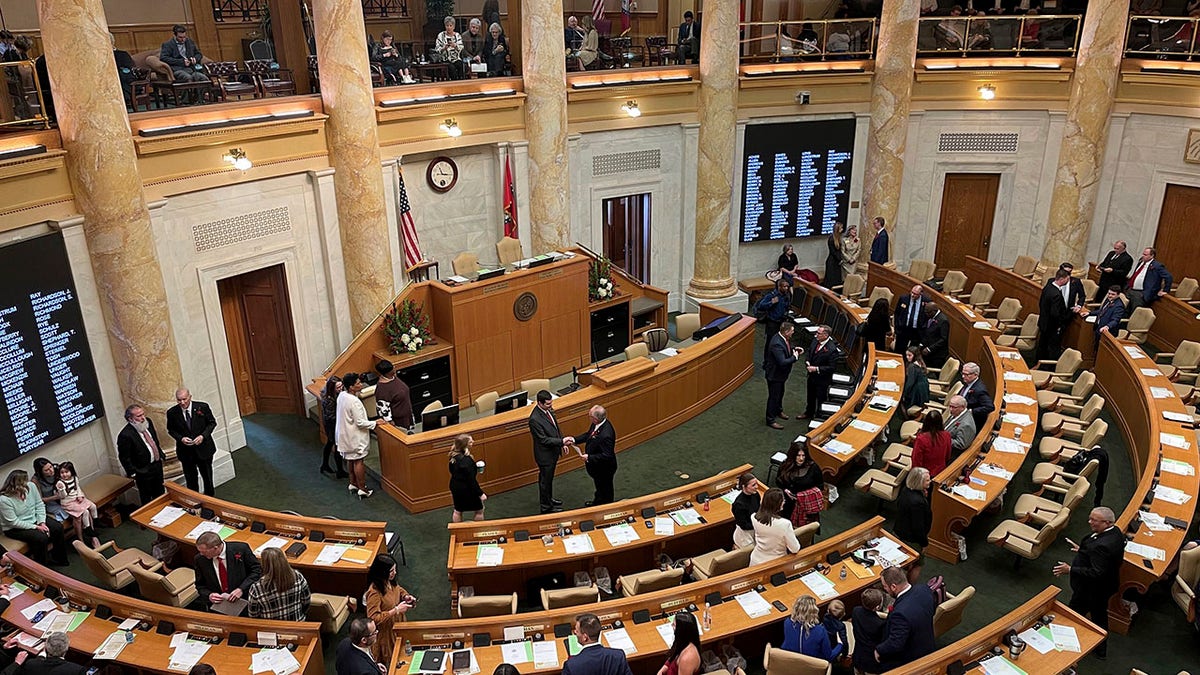Fox News Flash top headlines for February 1
Fox News Flash top headlines are here. Check out what's clicking on Foxnews.com.
The Arkansas House on Wednesday approved legislation preventing transgender people at public schools from using bathrooms that match their gender identity, while a legislative panel endorsed a measure restricting drag performances in the state.
The bills advanced through the majority-Republican Legislature two years after lawmakers approved restrictions on transgender youth, including a ban on gender-affirming care for minors that has been blocked by a federal judge.
Opponents of the bathroom bill said it's marginalizing transgender students who are already at high risk of bullying, and said it's a sign of misplaced priorities in the Legislature.
"When I talk to my constituents, they worry about many things but I never hear anything about bathrooms," Democratic Rep. Tippi McCullough, the House minority leader and only openly gay member of the state Legislature, said before the vote.
The legislation approved by the House on an 80-10 vote applies to multi-person restrooms and locker rooms at public schools and charter schools serving prekindergarten through 12th grades. Teachers, principals and superintendents who violate the measure could face fines from a state panel, and parents could file lawsuits to enforce the restriction.

The Arkansas House has passed a bill banning transgender bathroom access in public schools. ((AP Photo/Andrew DeMillo))
The bill now heads to the majority-Republican Senate. The Republican sponsor of the bill said she introduced it after being approached by members of the school board in the central Arkansas city of Conway, which enacted a similar policy last year.
"Each child in our schools has a right to privacy and to feel safe and to feel comfortable in the bathroom they need to go to," Republican Rep. Mary Bentley said before the vote.
A wide-ranging bathroom bill was enacted in North Carolina in 2016 but rolled back a year later after it sparked boycotts and protests. Arkansas is one of several states where school bathroom bills have been proposed.
Similar laws have been enacted in Alabama, Oklahoma and Tennessee. Lawsuits have been filed challenging the Oklahoma and Tennessee restrictions. Bentley has cited a federal appeals court ruling upholding a similar policy at a Florida school district last year. Two other appeals courts have upheld transgender students' rights to use the bathroom corresponding with the gender identity.
The bathroom bill won initial approval hours after a House committee advanced legislation restricting drag performances. The measure, which now heads to the House for a vote, would make Arkansas the first state to restrict drag shows.
NORTH DAKOTA CONSIDERING BAN ON SEXUAL, LGBT-CENTRIC LIBRARY BOOKS
Drag story hours — which feature drag queens reading books to children — and other events featuring drag performers have prompted protests by right-wing activists who see them as harmful to children.
The bill originally classified drag performances as adult-oriented businesses, the same category used for strip clubs and adult theaters, and banned them from public property. The legislation was amended Wednesday to remove the reference to drag shows, but appears to place the same restrictions on them by creating a new category of "adult-oriented performances."
The new version of the bill defines adult-oriented performances as featuring someone nude or semi-nude and intended to appeal to "prurient" interests, a term that's not defined in the legislation. It also defines such performances as featuring the "purposeful exposure" of an anatomical area or prosthetic genitalia or breasts, or featuring a specific sexual activity.
Opponents said the bill, as amended, could go well beyond restricting drag performances.
CLICK HERE TO GET THE FOX NEWS APP
"At its core, it’s really trying to target the LGBTQ population and regulate speech affecting all of us and overstepping into the rights of parents to raise their own children," Holly Dickson, executive director of the American Civil Liberties Union of Arkansas. "The amendment didn’t fix any of those fatal problems."





